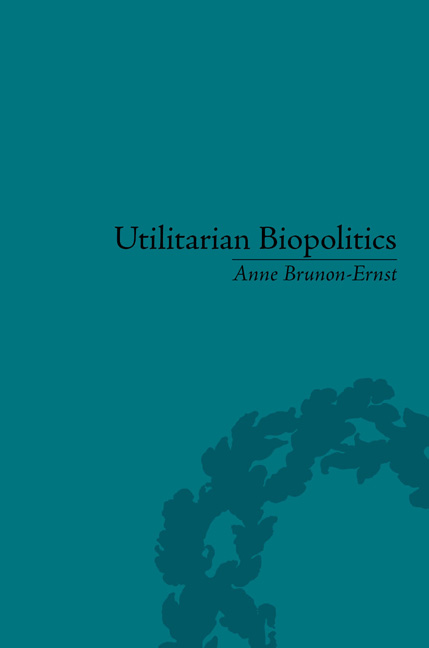Book contents
- Frontmatter
- CONTENTS
- Acknowledgements
- General Introduction
- Part I Biopolitics of Interests Introduction: From Interest to Norms
- Part II Utilitarian Conduct of Conduct Introduction: Legal Norms, Extra-Legal Norms and Utilitarian Conduct
- Part III The Biopolitical Expert Introduction: The Moralist and the Economist
- Epilogue: (De)Constructing Biopolitics
- Notes
- Works Cited
- Index
Part III - The Biopolitical Expert Introduction: The Moralist and the Economist
- Frontmatter
- CONTENTS
- Acknowledgements
- General Introduction
- Part I Biopolitics of Interests Introduction: From Interest to Norms
- Part II Utilitarian Conduct of Conduct Introduction: Legal Norms, Extra-Legal Norms and Utilitarian Conduct
- Part III The Biopolitical Expert Introduction: The Moralist and the Economist
- Epilogue: (De)Constructing Biopolitics
- Notes
- Works Cited
- Index
Summary
Part II identified three ways in which conduct can be influenced: direct legislation, indirect legislation and private deontology. Here, the role of the utilitarian legislator needs to be distinguished from that of the utilitarian moralist.
To give increase to the influence of sympathy at the expense of that of self regard, and of sympathy, and of sympathy for the greater number at the expense of sympathy for the lesser number, – is the constant and arduous task, as of every moralist, so of every legislator who deserves to be so.
In the study of ethics and economics, the spotlights are turned away from the concepts of ‘conduct of conduct’ and ‘influence’, and towards the concept of ‘expertise’. Two experts are considered: the moralist (who is called ‘deontologist’ and ‘parrhesisates’ by Bentham and Foucault, respectively) in Chapter 5, and the economist in Chapter 6. Some questions are common to both players: who exactly are these normative authorities? From where do they derive their knowledge of norms? Why are their prescriptive statements obeyed? The underlying assumption is that both play a normative role in a biopolitical environment.
Norms play a central part in Bentham's ethics and economics since his principle of utility is an ethical and descriptive normative statement. Law is to be distinguished from ethics in the sense that an act which is not conformable to utility is not necessarily a legal offence.
- Type
- Chapter
- Information
- Utilitarian BiopoliticsBentham, Foucault and Modern Power, pp. 87 - 90Publisher: Pickering & ChattoFirst published in: 2014



